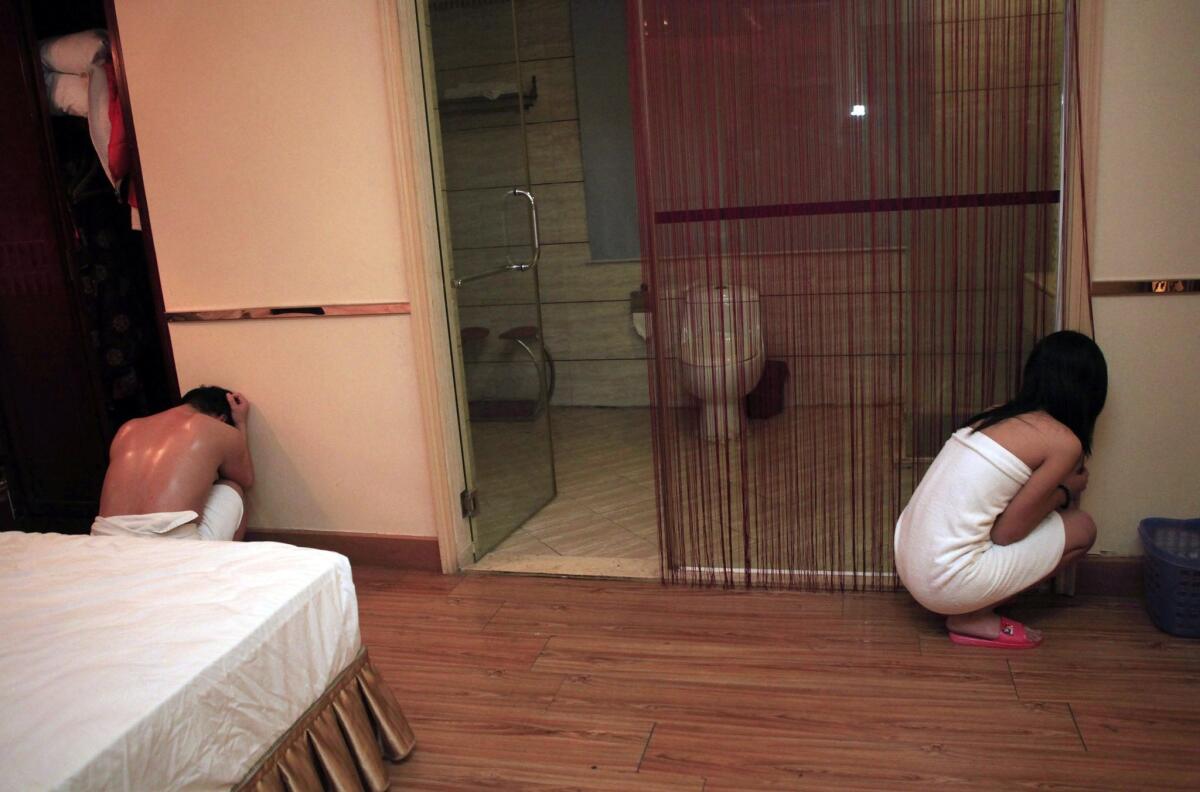China TV expose on sex workers sparks angry backlash

- Share via
BEIJING -- A salacious investigative report on state-run Chinese television, detailing widespread prostitution in the southern city of Dongguan, boomeranged on broadcaster CCTV on Monday as a vocal contingent of citizens rallied to the defense of the city’s sex workers and others wondered what political motives might lie behind the expose.
In the extensive segment aired Sunday night, CCTV reporters using hidden cameras visited several upscale hotels, including a Sheraton, and karaoke clubs in Dongguan.
Staff escorted the journalists to hotel rooms and ballrooms, where young women in revealing clothing would parade in for their choosing. Supervisors would explain the “tips” required for each woman; in some cases, the prostitutes wore small badges indicating their prices. The fees began at about $100.
The report revealed the well-organized and professional nature of the operations; one hotel was apparently even constructed with 50 rooms on the third floor equipped with viewing booths -- through one-way glass, customers could select a particular woman. Detailed service menus were printed, and a complaint system was in place in certain locales to allow customers to lodge grievances if they were not satisfied with the treatment provided.
In wake of the journalists’ findings, state-run media reported 67 people were arrested and 12 karaoke clubs, saunas and other venues were closed. Local police station supervisors were also reportedly suspended.
Dongguan has long had a reputation as a major center in the sex trade. Prostitution is illegal in China, and prostitutes and their customers are subject to arrest and fines; steeper penalties can be imposed on those who organize illegal sex-worker rings.
Rather than laud the reporters’ findings, however, many viewers swiftly blasted CCTV in online forums and on social media platforms, chastising the broadcaster for undermining the livelihoods of ordinary people. An image of a penis-shaped candle with the slogan, “Hold on, Dongguan!” was widely circulated.
“Dongguan, please don’t cry,” wrote one person on the Sina Weibo microblog platform. “CCTV is heartless, but there’s love in this world. Let’s unite together and extend our hands when there’s a disaster!”
Zhou Xiaozheng, a professor of sociology at Renmin University, said the backlash to the broadcast was rooted in increasingly liberal ideas toward prostitution and in a sense that authorities were willfully ignoring major problems and focusing on small issues such as brothels instead.
“There are two sides of this anger: One is that over the last 35 years of opening up, people have come to realize you sell you brains or you sell your body. Either way, it’s honest work,” he said. “Like athletes, these women are selling their youth. ... Attitudes on this issue are changing.”
“Second, there’s a feeling that CCTV could pay attention to many other stories, like corrupt officials and officials trying to take money abroad. Why is CCTV trying to take out vulnerable prostitutes who are just working?”
Ye Haiyan, a former sex worker turned activist, said she was “pretty shocked” by the broadcast, noting that it was the first time state-run media had offered such a detailed look at the inner workings of the sex industry, presenting it as a “mature” and sophisticated business.
Although she said she feared the report could lead to a punishing crackdown on sex workers, she was trying to “stay positive” and hoped that the broadcast would bring discussion of legalizing prostitution further out into the open.
“There has been a big change of opinion on this topic,” Ye said. “Before, people used to just criticize sex workers when such news was presented, but now people are more sensitive to how these workers survive, and also to how corruption contributes to it.”
After the broadcast, Guangdong Communist Party Secretary Hu Chunhua announced that the province would launch a special task force on prostitution in Dongguan. He said public security forces should crack down on the sex industry just like they did against drug manufacturers and traffickers last year.
In one high-profile raid in late December, thousands of police descended on a small town known as a major hub of methamphetamine production, arresting 182 people and seizing tons of the drug.
Hu, a rising young star in the Communist Party, was appointed to his post in Guangdong in 2012, and some observers speculated that the high-profile anti-drug and prostitution campaigns are part of an orchestrated effort to burnish his credentials.
Zhou, the professor, voiced confidence that political forces were at work in the CCTV report and subsequent police action, but said it was too early to say exactly what they were.
“CCTV is definitely under orders from the leaders ... so whenever there is a sudden crackdown, there’s a political reason behind the bad publicity,” he said. “We can’t know now, but in time, it will become clear what’s behind it.”
Twitter: @JulieMakLAT@latimes.com
Tommy Yang in the Times’ Beijing bureau contributed to this report.
More to Read
Sign up for Essential California
The most important California stories and recommendations in your inbox every morning.
You may occasionally receive promotional content from the Los Angeles Times.














